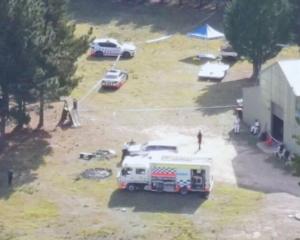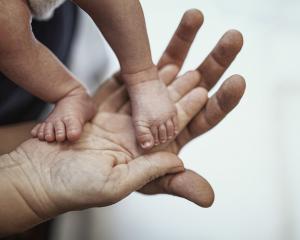
In the first episode of her new podcast, Confessions of a Female Founder, the Duchess of Sussex, said the medical condition was a "huge medical scare" the 43-year-old had to manage without the world knowing what was going on.
Britain's National Health Service (NHS) says on its website that pre-eclampsia is a condition that affects some pregnant women, usually during the second half of pregnancy or soon after their baby is delivered.
Early signs of pre-eclampsia include having high blood pressure and protein in the urine. In some cases, symptoms can include severe headaches, vision problems, pain below the ribs and vomiting, according to the NHS.
"It's so rare. And it's so scary," the mother of two said, describing the condition.
Meghan did not say if she faced the medical complication after the birth of her son, five-year-old Archie, or her daughter Lilibet, who is three.
"You're still trying to juggle all these things and the world doesn't know what is happening. You're still trying to show up, mostly for your children. But those things are huge medical scares."
Her first podcast guest was Whitney Wolfe Herd, chief executive of online dating platform Bumble.
Herd said in the podcast that she had also suffered from the condition, which she described as "life or death".
The NHS said many cases of pre-eclampsia are mild but the condition can lead to serious complications for both the mother and the baby if it is not monitored and treated.
Harry in court over security changes
Prince Harry on Tuesday made a rare public appearance at London's Royal Courts of Justice to fight the government over changes made to his security after he stepped down from royal duties, which his lawyer branded unjustified.
Harry, King Charles III's younger son, is trying to overturn a decision by the Home Office - the ministry responsible for policing - which decided in February 2020 that he would not automatically receive personal police security while in Britain.
Last year, the High Court in London ruled the decision was lawful, but the Court of Appeal agreed to hear the case following a direct application from Harry's lawyers. He arrived smiling and waving for the two-day hearing.
His lawyer Shaheed Fatima told the court the agency which protects royal and public figures had treated the Duke of Sussex on a "bespoke" basis not applied to anyone else. "It means he has been singled out for different, unjustified and inferior treatment," she said, saying he was not seeking to be treated as he was when a working member of the royal family.
Harry, 40, listened intently as the packed courtroom heard mainly technical legal submissions.
In written submissions, Harry's lawyers said al Qaeda had recently called for him to be murdered, and he and Meghan had been involved in "a dangerous car pursuit with paparazzi in New York City" in 2023.
It was not clear if Harry, now living in California, would be seeing any of his family from whom he has become estranged since his public criticism of his relatives and royal aides.
King Charles and Harry's stepmother Queen Camilla are on a state visit to Italy where they will be celebrating their 20th wedding anniversary.
Harry, along with other senior royals, had received full publicly-funded security protection before he stepped back from his royal duties in March 2020.
The Executive Committee for the Protection of Royalty and Public Figures, then decided Harry would no longer receive the same level of protection.
The government's lawyer, James Eadie, said the decision was not that personal security should not be provided, but it would not be on the same basis due to the duke's change of status and moving abroad. He said the bespoke arrangement served Harry better.
The case against the government is one of a number of legal forays the prince has made in recent years, having taken action against a number of British newspapers over invasions of privacy and phone-hacking.











